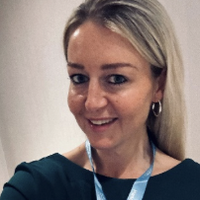Before you watch this webinar
Enhancing your learning experience begins with understanding you better. Collecting data enables us to tailor our educational content specifically for our audience. Discover more about how we handle your information in our Privacy Policy.
Event
Innovating headache care: service setup and redesign benefits
Our sponsor

This webinar has received sponsorship from Teva UK Limited. The sponsor has had no input into the educational content or organisation of the session.
Innovating headache care: Service setup and redesign benefits
Major changes are underway in neurology care, with national initiatives aiming to modernise and streamline services across the headache patient pathway.
In this webinar, Sue Thomas, independent healthcare consultant and member of the NHS England Neurology Transformation Clinical Reference Group, gave a whistlestop tour of the policy agenda driving change. And Siobhan Jones, headache nurse consultant at the North Cumbria Integrated Care (NCIC) Trust, explained how her own redesigned service is turning this future vision into a reality today.
Evolving landscape
Sue explained that both the NHS Fit for the Future 10-year plan for England and the Neurology Service Transformation Programme will have a bearing on how headache services will be delivered in the coming years.
Fit for the Future is an overarching strategy for the health service, built on three key pillars:
1) Moving care from the hospital to the community by expanding neighbourhood health centres and integrated care boards (ICBs);2) Moving from analogue to digital with the increased use of tools such as the NHS app, artificial intelligence and remote consultations;3) Shifting the focus from sickness to prevention, with early intervention and prevention through public health and lifestyle measures.
These pillars are underpinned by structural reforms, such as the merger of NHS England and the Department of Health and Social Care, expected in 2027, greater “clustering” of ICBs, and an expansion in neighbourhood care.
In addition, a new Specialist Neurology Adult Services Specification was published in August 2023. This replaced the previous 2013 specification, which incentivised headache management in neuroscience centres, and sets out the structure, expectations, and outcomes of neurology services.
“We are looking at delivering neurology and headache care through joined up, integrated neurology systems for populations of between 1 million and 3.5 million,” said Sue. “Unlike the previous hub and spoke models… it is designed to integrate services between primary, secondary and tertiary care, while still maintaining accountability through the specialised systems.”
It means that the majority of headache care should be delivered “as much as possible” out of hospital, commissioned by ICBs and planned at integrated care system (ICS) level.
Transformation will require a ‘whole pathway’ shift, away from referring people to specialist neurology services and instead working within the community to prevent headache wherever possible, Sue said. That might involve collaborating with community pharmacies, social prescribers, health coaches and the voluntary sector, as well as schools and workplaces.
Where headaches cannot be prevented, people might be referred to GPs with a special interest or nurse-led community-based clinics, rather than hospital, with only those who really need it being seen in specialist neurology services.
“By doing this we will hopefully reduce waiting list times and get a lot more people seen at an earlier stage,” said Sue.
Designing and commissioning these future services will require local population data, such as that available via the Adult Neurology ICB dashboard, she added.
An innovation in headache services
The current approach to headache care in the NHS has significant limitations, explained Siobhan.
Primary care tends to be the first point of contact for people experiencing headache, but GPs report low confidence in diagnosing migraine effectively. There is an overreliance on over-the-counter medications, and limited focus on evidence-based preventative strategies.
Even when patients are referred into secondary care, services are “patchy and inconsistent”, with significant regional variation in referral pathways, waiting times, and treatment availability. The provision of headache nurses, who provide assessment, education and treatment, is limited, and, again, varies by geography.
“When we look at the gaps and the challenges, it goes without saying there is access inequality,” said Siobhan, adding that this contributes to under-diagnosis and under-treatment, with up to 50% of people who experience migraine being undiagnosed.
“We need to expand the role of headache nurses and headache nurse consultants, and havemore nurse-led clinics, which will offer a solution.”
The NCIC Headache Referral Pathway is an innovative approach that aligns with the national initiatives set out by Sue.
People with headache still present at primary care where they undergo initial assessment, andsimple cases are managed by the GP.
All others are referred to a NCIC headache triage hub, which carries out a central review, and prioritises cases into a nurse-led clinic for assessment and diagnosis. Complex cases are referred to tertiary, specialist services, while all others remain within Siobhan’s caseload.
“A range of treatments are offered, but most importantly, we provide education,” said Siobhan, adding that once people “understand what migraine is”, they start to gain some control over their condition.
“A lot of patients have been suffering with this for 20 or 30 years, and now they are finally understanding the headaches and migraines, and it is quite a breakthrough.”
All care plans are personalised, and the clinic also provides “vital” ongoing support, review, follow-up and action planning. That includes guidance on mental health and lifestyle planning, and identifying triggers, as well as monitoring treatment response and adjusting interventions as necessary.
In addition, the team offers advice and guidance to GPs, in the case of diagnostic uncertainty or to help with early management. “This avoids the patient having to be in a waiting list,” said Siobhan. “Usually we get back to them within four or five working days with a with a management plan.”
Headache nurses are delivering advanced treatments and “helping patients to access care faster”, but it is important to remember that migraine care is multidisciplinary. Siobhan works with physiotherapists, psychologists, and is currently trying to link with pharmacists who can help with treatment management and education.
Spreading innovation
Strategic planning and leadership is needed to set up similar pathways nationally, Shiobhan said.
Services should link with NHS Long Term Plan and ICS strategies, as well as the Getting it Right First Time (GRIFT) Neurology Programme. Plans should be based on a local needs assessment of regional headache prevalence, existing capacity, and access inequalities. Clinical champions, such as headache nurse consultants or neurologists, who are committed to driving service redesign at a local level “would be a great idea”.
It will also require workforce development, expanding the role of headache nurses, and enabling interdisciplinary collaboration. The need for training and education “goes without saying”, and a Royal College of Nursing national training framework for headache nurses “is on the horizon”.
Services should be designed and funded at the ICS-level, based on evidence-based business cases that demonstrate how localised headache care reduces emergency and outpatient admissions, shortens wait times, and improves patient satisfaction.
Ultimately, the approach delivers improved cost efficiency. “Delivering advanced therapies locally reduces tertiary referrals, freeing up capacity in major centres,” added Siobhan.
Headache disorders are among the most common neurological condition worldwide. Globally, around 50% of adults experience a headache each year with migraine alone affecting over 1 billion people and ranking as the second leading cause of years lived with disability (GBD,2019)
Headache is the commonest neurological presentation and causes huge demand on both primary care and neurology services. 4% of neurology consultant referrals annually are for headache alone, many patients with headache disorders are contributing to the backlog of out-patient waiting times which Trusts are working hard to address.
Headache assessment and treatment for common headache disorders such as migraine, should be undertaken jointly between primary and secondary care. This may include intermediate community services, including GP’s with extended role, headache nurse specialists, headache services and self management programmes. Clearly we need to build capacity in systems so that more people with headache can be managed by competent professionals who can also advise them on how they can self manage and prevent headaches reoccurring.
Whether you’re a neurologist, specialist nurse, nurse, GP or allied health professional, this session is designed to enhance your knowledge, improve clinical confidence, and support collaborative care planning for clinicians wanting to consider new ways to deliver headache services. This webinar will provide details on how a nurse specialist can support headache management more efficiently and discuss how you may develop a similar service in your own neighbourhood.
Objectives
- To highlight how the headache nurse specialist can improve management of people with
headache - Detail how a post has been established in the community in NE Cumbria
- Provide example case studies from clinical practice
Sue Thomas - presentation slides
Siobhan Jones - presentation slides
Our sponsor

This webinar has received sponsorship from Teva UK Limited. The sponsor has had no input into the educational content or organisation of the session.
Uniquely practical education, producing specialist clinical leaders transforming local healthcare
Neurology Academy is an innovative educational provider for healthcare professionals including consultants, specialist nurses, pharmacists, therapists and other allied health professionals. Our courses are developed by practicing specialists who combine their experience and expertise into case-based learning designed to create specialists in their field with confidence in effecting change.

